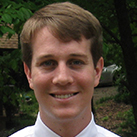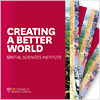PHP Doctoral Student Douglas Fleming Wins Glovin Award
Douglas Fleming, a third-year student in the Population, Health and Place Ph.D. program, has been awarded The 2018 Irving and Jeanne Glovin Award.
Established by the Oskar Schindler Humanities Foundation, the Glovin Award fosters research into the meaning and underlying principles for “good human conduct.” Through this award, the Oskar Schindler Foundation strives to stimulate scholarly work that defines “good human conduct” with which all persons could agree, to explore its sources, and develop pragmatic educational strategies and ways of teaching children, to show by action, respect and acceptance of others by peoples of the world regardless of circumstances or background.
According to the foundation, the spirit of the research may be illustrated by the words of Confucius: “Do not do unto others what you would not have them do unto you.”
Fleming’s co-advisor, Dr. Ann Owens, associate professor of sociology and spatial sciences, described his dissertation project as a multidisciplinary investigation of how to facilitate good human conduct—in this case, how to promote bystander intervention in the event of an out-of-hospital cardiac arrest (OHCA). Dr. Owens said, “His project considers individual-level factors—for example, is bystander intervention more likely among people from the same racial/ethnic group as the person experiencing an OHCA—as well as social contextual factors. He will use advanced spatial and statistical techniques to model where and when bystander intervention is more or less common. Then, he will draw on multiple datasets to try to figure out why this variation across place and time exists. His proposed project moves well beyond extant research that looks at simple measures of neighborhood context. Douglas aims to understand the character of places—how people experience it, and how that shapes their actions. Does the “neighborliness” of neighborhoods induce good human contact? Does the density of people at different times of day affect the odds of intervention? Does racial/ethnic diversity in a neighborhood facilitate more or less altruistic behavior?”
Fleming’s goal is to produce a series of scholarly articles that will contribute to the research base, as well as actionable products that the Los Angeles Fire Department and other emergency personnel can draw on to identify where and how they should focus on promoting good human conduct of bystander intervention. This month he presented a poster “Spatial Distribution and Temporal Trends of Low Bystander CPR in the City of Los Angeles” at the American Heart Association Scientific Sessions in Chicago, Illinois. He recently has co-authored two articles,“Nicotine Replacement Therapy Sampling via Primary Care: Methods from a Pragmatic Cluster Randomized Clinical Trial” in Contemporary Clinical Trials (Sept. 2018; Vol 72(1-7, doi: 10.1016/j.cct.2018.07.008) and “Low blood pressure is associated with greater risk for cardiovascular events in treated adults with and without apparent treatment-resistant hypertension” in Journal of Clinical Hypertension (Mar. 2017; Vol 19(3; 241-249, doi: 10.1111/jch.12904).
The Glovin Award provides Fleming with a cash stipend that he can use for travel to conferences, research, or living expenses. Dr. Owens also received a research grant in connection with Fleming’s award.
Prior to starting his Population, Health and Place doctoral studies, Fleming was a researcher with the Care Coordination Institute working with grants from the National Institute of Health, the National Institute on Drug Abuse and the Center for Disease Control on issues ranging from tobacco use prevention to obesity and heart disease. He has a Master of Public Health in Health Policy Management and a B.S. in Health Promotion and Behavior, both degrees from the University of Georgia.
Dr. Robert O. Vos, assistant professor (teaching) of Spatial Sciences and director of graduate studies of the USC Spatial Sciences Institute, said, “Douglas is a great example of the kind of interdisciplinary researcher and scholar we envision in the Population, Health and Place Ph.D. program – someone who pursues research interests at the intersections of demography, sociology, preventive medicine, and spatial sciences with the capacity to integrate intellectual curiosity with technical skills. We congratulate him on this prestigious award and look forward to his continuing contributions to health care policy and practice.”
To learn more about the USC Spatial Sciences Institute Ph.D. Program in Population, Health and Place, visit https://spatial.usc.edu/doctoral-programs/ph-d-in-population/.





